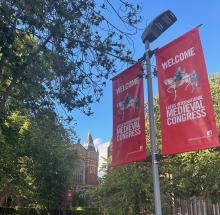Cartusiana-sponsored sessions at the IMC Leeds 2023

Session 531 - Carthusian Entanglements in Mystical Reform and Intellectual Networks
Tuesday 4 July 2023: 09.00-10.30
Sponsor: Cartusiana / Cusanus Society of UK & Ireland
Organisers: Tom Gaens, Ruusbroecgenootschap, Universiteit Antwerpen / Stephen J. Molvarec, School of Theology & Ministry, Boston College, Massachusetts
Moderator/Chair: John Arblaster, Ruusbroecgenootschap, Universiteit Antwerpen
Paper 531-a Intellectual Networks and Authorities: How Denys the Carthusian in his Scripture Commentaries Utilised Thomas Aquinas and Nicholas of Lyra
William P. Hyland, School of Divinity, University of St Andrews
Paper 531-b Ecclesia semper reformanda: Mystical Reform in Nicholas of Cusa and Denys the Carthusian
Simon Burton, School of Divinity, University of Edinburgh
Paper 531-c New Books for New Ideas: The Production and Transmission of Texts Within the Benedictine Network of the Melk Reform
Astrid Breith, Institut für Mittelalterforschung, Österreichische Akademie der Wissenschaften, Wien
Abstract: During the Later Middle Ages, Carthusian monks became increasingly entangled in intellectual networks and ideas of mystical reform. This session's papers explore Carthusian involvement in the circulation of reformist ideas in a later medieval context. Instances of reformist entanglement treated range from the creative tensions in Denys the Carthusian's scriptural commentaries, to the role of mysticism in Nicholas of Cusa's and Denys the Carthusian's joint endeavour at the Council of Basel and Cusa's reforming visitation of 1450-1451, to the production and transmission of textual witnesses central to the Melk Reform. Each paper attempts to reconstruct intellectual networks and the dynamics of dissemination of new ideas.
https://imc.leeds.ac.uk/dbsql02/AQueryServlet?*id=30&*formId=30&*context...
Session 1039 - 'Till Death Do Us Part': Medieval Hermits, Dying, and 'Death' to the World
Wednesday 5 July 2023: 09.00-10.30
Sponsor: Cartusiana
Organiser: Tom Gaens, Ruusbroecgenootschap, Universiteit Antwerpen / Stephen J. Molvarec, School of Theology & Ministry, Boston College, Massachusetts
Moderator/Chair: Emilia Jamroziak, Institute for Medieval Studies / School of History, University of Leeds
Paper 1039-a 'Knock, Knock': Brushes with Death in the Carthusian Cell
Millicent-Rose Newis, Faculty of English, University of Cambridge
Paper 1039-b Porta caeli?: Interment, Networks, and Death at the Parisian Carthusian Charterhouse
Stephen J. Molvarec, School of Theology & Ministry, Boston College, Massachusetts
Paper 1039-c 'In between two deaths': The Monstruous and the Sublime in Later Medieval Carthusian Life
Tom Gaens, Ruusbroecgenootschap, Universiteit Antwerpen
Abstract: St Paul wrote to the Galatians of a death to the world, often read as fuga mundi. Death - symbolic and actual - was omnipresent in eremitical life. Sometimes, as in the case of 12th-century Italian women hermits, monastics moved in and out of enclosure (i.e., 'monastic death') on account of pressure from male communities and churchmen. Symbolic 'death' was one thing, preparing for actual death while living an enclosed life - as did the Carthusians Richard Methley and John Blacman - was another. Increasingly, too, Parisian Carthusians welcomed interment of non-members in their monasteries, with a mid-13th-century elimination of the prohibition on such practices. Eremitical life was bracketed by dying from the moment of entrance until the time of physical expiration. A hermit's life, too, was surrounded continually by thoughts and reminders of death.
https://imc.leeds.ac.uk/dbsql02/AQueryServlet?*id=30&*formId=30&*context...
